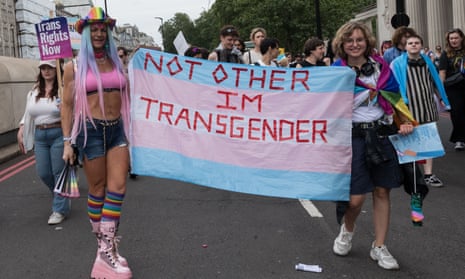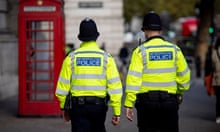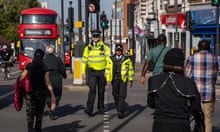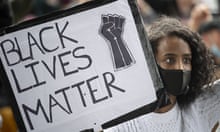A record number of hate crimes were committed against transgender people last year in England and Wales, even as racist and homophobic hate crimes recorded by police fell for the first time on record.
In the year ending March 2023, 4,732 hate crimes against transgender people were recorded – a rise of 11% on the previous year. The Home Office report said that comments by politicians and the media over the last year may have led to an increase in these offences.
Rishi Sunak’s keynote speech to the Conservative conference seemed to argue that transgender identities were not valid. “A man is a man and a woman is a woman. That’s just common sense,” he said.
The number of racist hate crimes recorded by police in England and Wales fell for the first time on record – driven by a decrease in racially aggravated public fear, alarm or distress offences.
Figures released by the Home Office show there were 101,906 racist hate crimes recorded in 2022-23 – down 6% from 2021-22. However, the figure was still higher than the 90,909 recorded in 2020-21.
Homophobic hate crimes also fell by 6% over the last year to 24,102 – the first fall since March 2013 – while disability hate crimes fell by 1%.
However religiously motivated hate crimes rose last year by 9% – with a record 9,387 documented in the year to March. Two in five religious hate crimes were against people perceived to be Muslim, while one in six were against people perceived to be Jewish.
Just 7% of all hate crimes were dealt with by a charge or court summons – down from 9% in the year ending March 2022. There was an increase in cases where victims did not support police action as well as cases where no suspect was identified.
Transgender- and disability-based hate crimes were less likely to result in a charge or court summons than hate crimes based on a person’s race, religion or sexual orientation.
Since 2011-12, the number of hate crimes recorded by police has more than tripled. However, police forces have made large improvements in how they record crime over the last decade, and have also improved their identification of what constitutes a hate crime – meaning the rising figures may not truly reflect a rise in actual hate crimes taking place over that period.
The Home Office said the overall fall in the figures could be linked to interim guidance published last year which “may have led to greater scrutiny of the threshold of what constitutes a criminal offence of public fear, alarm or distress”.
However its report noted: “Transgender issues have been heavily discussed by politicians, the media and on social media over the last year, which may have led to an increase in these offences, or more awareness in the police in the identification and recording of these crimes.”
The LGBTQ+ group Stonewall criticised political leaders for not having acted “seriously or quickly enough” against hate crime, adding that “many of them are filling the public domain with toxic language that dehumanises LGBTQ+ people”.
Leni Morris, the CEO of the LGBT+ anti-abuse charity Galop, said the figures did not reflect what the charity had seen in its services.
She said: “In the last year alone we have seen a 65% increase in LGBT+ victims of hate crime coming to us for support.
“These figures have never captured the true picture of hate crime in this country. The government’s own research shows that over 90% of anti-LGBT+ hate crimes go unreported – this is a case of poor data not reflecting reality.
“We believe this reflects a decrease in trust of police and the criminal justice system, and fewer victims coming forward to formally report what has happened to them.”
A Home Office spokesperson said: “There is no place for hate in our society, it does not reflect the values of modern Britain, and we remain committed to ensuring these abhorrent offences are stamped out, which is why we have a robust legislative framework to tackle it wherever it is found.
“These statistics show there has been an overall reduction in hate crimes recorded by police, and the numbers of sexual orientation, race and disability hate crimes all fell.
“Whilst the increase in transgender hate crime may be due to a genuine rise, the biggest driver is likely to be general improvements in police recording.”
The Home Office said that any instance of hate crime was “one too many” and that it expected the police to “fully investigate” all such incidents and “make sure the cowards who commit them feel the full force of the law”.









